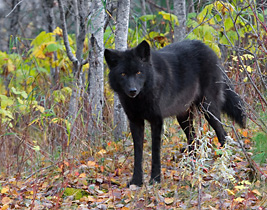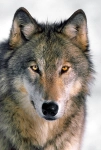More and more ranchers, in the US and around the world, are using guard donkeys to protect their livestock from predators.
There is no love lost between the Equidae and Canidae families. Donkeys, especially jennies, are very protective of animals they graze with and will run at, chase,stomp, kick and even kill any canine they encounter. They are also used to guard cattle from jaguars in Belize.
If ranchers are looking to protect their livestock from minimal predation, they might want to shell out $300 and purchase a donkey. This could be the answer to their problem. Now wouldn’t that be a kick in the ass?
=======
Guard Donkeys Help Ranchers Protect Herds
Aug 7, 2007 9:59 am US/Central Associated Press
(AP) MILANO Coyotes and wild dogs were slaughtering calves on Herbie Vaughan’s ranch in the Cedar Creek valley south of Milano until about eight years ago when he took an old-timer’s advice and installed guard donkeys in the herd.
“When I put the donkeys out there, I no longer had a coyote problem,” says Vaughan. “It’s like they disappeared. I don’t know why, but it worked.”
Sage ranchers have learned to take advantage of the intrinsic aggression between members of the Equidae and Canidae families, said Jon Gersbach, Texas Cooperative Extension county agent for ag and natural resources in Milam County.
In short, horses, donkeys, mules, and zebras loathe the company of dogs, wolves and their coyote cousins, and they are not too nice about it either, Gersbach said.
Donkeys, the most intolerant of the family, will “attack and kick” coyotes and dogs, Gersbach said.
“They will bray, run them down, bite them, and either chase them off, or if they get the chance, they will kick them, and they will pound them.”
They are very protective in the right environment, thus, there is a formula for a successful donkey security system, Gersbach said.
Jennies rather than the jacks of the species are superior pasture guards because of maternal, protective characteristics, Gersbach said. Donkeys, or burros, gravitate toward bonding with whatever livestock happens to share their pasture, whether it is horses, cattle, sheep, or goats.
However, too many donkeys in one meadow will encourage herd behavior and yield less effective protection. The most effective pasture guardians arrive at a young age and grow up among their animal neighbors. Donkeys have the advantage over working dogs in pasture settings because they eat the same food as other livestock, Gersbach said.
Guarding Vaughan’s herd is two Jennies and a jack colt.
“I have had a couple of jacks, but I had to get rid of them,” Vaughan said. “It is my understanding in talking with other folks, if jacks are not raised being around cows, sometimes they get a little aggressive toward cows. The jack I have out there right now is young. The whole time he’s been on the place, he’s been with those cattle, and he doesn’t seem to have a problem.”
Vaughan’s sentry-duty donkeys require little maintenance, and routinely demonstrate an attitude problem, the same inbred stubbornness, and ornery characteristics associated with a mule — the offspring of a male donkey and mare.
“They eat the grass and drink the water, I worm them and check their hooves. They will come up to the truck and eat peppermint candy out of my hand,” Vaughan said. Freckles, Happy and Little One respond when Vaughan whistles and are treated as pets, nibbling treats offered by the children, he said.
Vaughan paid about $300 for the two Jennies, and borrowed a jack, hence the arrival of Little One.
Though they act like family pets, they have behaved ferociously toward Vaughan’s two German shepherds, Char and PC, and “tried to stomp them.”
John Young, Texas Parks and Wildlife Department mammalogist of Austin, said donkeys and llamas are widely used among ranchers, particularly those with goats and sheep, to protect farm animals from predators.
“They are going to try to kick them, stomp them, they run at them, bite them, grab them, and throw them around if they can. If they can catch one, they will kill it,” Young said.
Confrontations between a burro and coyote are usually one-on-one because pack behavior by coyotes is uncommon, said Young, a coyote expert. Coyotes weigh an average of 25 pounds, and normally attack calves that are newborn, sick or injured, he said.
Texas Cooperative Extension reported that between 1,000 to 1,800 of Texas’ 11,000 sheep and goat producers use donkeys as pasture defenders. In one survey, 59 percent of producers rated donkeys, good or fair for deterring predators, primarily coyotes. In Colorado, 99.3 percent of sheep producers use donkeys to protect their herds, the extension service reported.
Experts recommend challenging a new donkey with a dog to test its response to canines, and to bypass donkeys that are not aggressive.
Donkey defenders are commonplace on small cattle operations, but large ranchers merely budget for calf losses from illness and predators, Gersbach said. Donkey devotees swear by their pasture protectors, though.
“If they save one calf a year, they are paying for their own way,” Gersbach said. “There will be some people that will swear by them, and there will be some people that are not going to be interested in them.”
http://www.solacefarm.com/protection.htm
=======
Smart Asses: Are Donkeys a Rancher’s Best Weapon for Protecting Cattle from Jaguars?
=======
Ranchers turn to natural security vs. wolves |
| Written by LOREN UNDSETH |
Thanks Grey Wolf for bringing this to my attention and for the link!
Photo: Courtesy Sebeka * Menagha Review Messenger, Wikimedia Commons and FunPic
Posted in: gray wolf/canis lupus, wolf education, Ranchers using proactive measures
Tags: donkeys, guard animals, pro-active ranchers











 Boulder White Clouds Council
Boulder White Clouds Council Exposing The Big Game
Exposing The Big Game Footloose Montana
Footloose Montana Friends of the Clearwater
Friends of the Clearwater Lockwood Animal Rescue Center
Lockwood Animal Rescue Center Louise du Toit
Louise du Toit LUPUSLAETUS
LUPUSLAETUS Mercy For Animals
Mercy For Animals Northern Idaho Wolf Alliance (NIWA)
Northern Idaho Wolf Alliance (NIWA) Predator Friendly®- Because Wildlife Matters
Predator Friendly®- Because Wildlife Matters Project Coyote
Project Coyote Project: Wolf
Project: Wolf The Nature Conservancy
The Nature Conservancy The Ravensong Group
The Ravensong Group WildEarth Guardians
WildEarth Guardians Wisconsin Wildlife Ethic-Vote Our Wildlife
Wisconsin Wildlife Ethic-Vote Our Wildlife Wolf And Wildlife Studies: Jay Mallonee (Independent Wolf Biologist)
Wolf And Wildlife Studies: Jay Mallonee (Independent Wolf Biologist) Wolf Song of Alaska
Wolf Song of Alaska Wolves in english ! Les loups en anglais !
Wolves in english ! Les loups en anglais ! WWP's Gray Wolf Page
WWP's Gray Wolf Page Yellowstone To Yukon Conservation Initiative
Yellowstone To Yukon Conservation Initiative
Nabeki, That would be a great idea and implement.Only one can hope that someone uses their good senses and use it,in fact,just try it.
LikeLike
Hi Rita,
If only ranchers would be more pro-active, we wouldn’t have so many wolves dying. Llamas are also good protectors.
Actually I just wanted an excuse to post a donkey picture, they are so adorable.
N.
LikeLike
Although fatality may occur, the use of herd guardians works better than a bullet. The guards are a constant presence with livestock and predators learn that it is less of a pain to find food elsewhere. Although you get those that think that donkeys and dogs will just end up a wolf’s dinner.
LikeLike
I found your blog when I goolgled donkeys as guards for livestock. I will be back to do a lot of reading. I am very much pro wolf, although I am in Florida. thanks for all the info on donkeys, I have place a link to your blog with my post today. I will be back to look at the rest of your blog.
LikeLike
Hi Sandra,
Glad you found this site and I hope you enjoy exploring. Wolves are in terrible trouble and need all the support they can get. Montana and Idaho are being very brutal to them since they were delisted, they’ve basically declared war on them.
I love the donkeys and they do make great guard animals but they have to be the big ones usually.
Also please visit us Wolf Warriors on Facebook.
http://www.facebook.com/pages/Wolf-Warriors/106727146019024
We want to organize wolf advocates to help wolves even more.
For the wolves, For the wild ones,
Nabeki
LikeLike
This is important to note ive been wondering why ranchers don’t do more of this kind of practice. Seems they are insistant on killing as the solution.
LikeLike
Yes they are intent on killing. I was raised on a Montana Ranch with that attitude. Until the poison they put out affects their own, they will not change..and even then they often continue to kill as dogs etc are disposable in their mind.. Many lose their own dogs etc who get into the “bait” unintentionally. I have not lost a single animal, including newborn lambs or calves since employing donkeys.
LikeLike
EDUCATION IS THE KEY TO SAVING WOLF SPECIES WORLD WIDE. DONKEYS WILL HELP RANCHERS. STOP KILLING WOLVES WITH GUNS!
LikeLike
I have more of a question than a comment. Last week we purchased 3 male goats. Twins at 6 weeks and the 3rd goat is 8 weeks. Saturday we bought a 2/12 year old Jenny from a breeder. We kept them in adjacent areas to try and have them bond. They appeared to bond nicely. We took them in the pasture with us and all seemed well. The twins tend to be independent and drift off the group. The Jenny approaches them and as they retreat she stomps her feet as she chases them. I do not know whether she is being aggressive to them of trying to get the back with the 3rd goat. The twins run whenever she is near but the 3rd goat stays close and she occasionally sniffs him but doesn’t act aggressive towards him. Did we put them together to soon? I am afraid to trust them alone at this point. Could I be interfering by following along with them?
LikeLike
Hi Frank,
I”m not a goat expert but from practical experience I always find it best to separate animals that don’t know each other. Keep the baby goats in a pen that’s close to the donkey (Jenny) but not where the donkey can get to them. I would give them awhile to get to know each other before I put the donkey in with the baby goats. They may become great friends but if you push it the goats may forever be afraid of the her. Hope that helps.
N.
LikeLike
Own a dog? Think again, his d.n.a. Says wolf, middle eastern and some European species.
LikeLike
“Guard Donkeys? Ranchers Turn To Crabby
Equines To Watch Over Livestock! � Howling For
Justice” truly causes me contemplate a small bit further.
I actually appreciated each and every single element of it.
Thanks for the post -Marti
LikeLike
How do donkeys weather against Mountain Lions?
LikeLike
EXCELLENT! I was raised in an area of NW Montana and we always used guard donkeys. I now own a beautiful flock of St. Croix Hair Sheep. I have not lost one since I added Jasmine the donkey. She then had a jennet named Josie who is now a yearling. Jasmine was a rescue who was already pregnant with Josie. Even though Josie is just over a year old, they work as a pair. My predator problems have ceased and I no longer see wolves, coyotes or cougars. I hear them often at night, but they look elsewhere for dinner! In addition, my neighbors are grateful because they had lost cats and small dogs as well, which no longer happens.
LikeLike
Thank you for using free time to post “Guard Donkeys?
Ranchers Turn To Crabby Equines To Watch Over Livestock!
| Howling For Justice” whyamericansshouldcareabouttheroyalwedding .
Thank you so much again ,Peter
LikeLike